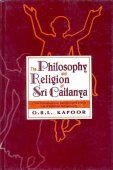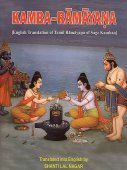Bondage: 2 definitions
Introduction:
Bondage means something in Hinduism, Sanskrit, the history of ancient India. If you want to know the exact meaning, history, etymology or English translation of this term then check out the descriptions on this page. Add your comment or reference to a book if you want to contribute to this summary article.
In Hinduism
Yoga (school of philosophy)
Source: ORA: Amanaska (king of all yogas): A Critical Edition and Annotated Translation by Jason BirchBondage is denoted by the Sanskrit term Bandhana, according to the Amanaska Yoga treatise dealing with meditation, absorption, yogic powers and liberation.—Accordingly, as Īśvara says to Vāmadeva: “I shall speak of the highest knowledge by which the highest reality becomes manifest and, as a result of which, all bondage (bandhana) beginning with the snare of hope is cut away. [...]”.

Yoga is originally considered a branch of Hindu philosophy (astika), but both ancient and modern Yoga combine the physical, mental and spiritual. Yoga teaches various physical techniques also known as āsanas (postures), used for various purposes (eg., meditation, contemplation, relaxation).
India history and geography
Source: Singhi Jain Series: Ratnaprabha-suri’s Kuvalayamala-katha (history)Bondage and Salvation (of souls) were investigated by those pursuing the spiritual life in the Hermitages (or Ashrams) of ancient India, as vividly depicted in the Kathās (narrative poems) such as Uddyotanasūri in his 8th-century Kuvalayamālā (a Prakrit Campū, similar to Kāvya poetry).—Page 87.20-28: Here is a vivid description of the intellectual and spiritual life in the Aśrama of a Jaina Muni. Uddyotanasūri gives a list of twenty-one methods of study and discussions and approaches to the tenets of religion and philosophy, [e.g., deliberating about Bondage and Salvation of souls] [...]. Also see the description of the hermitage of Divākara Mitra described by Bāṇa in the Harṣacarita.

The history of India traces the identification of countries, villages, towns and other regions of India, as well as mythology, zoology, royal dynasties, rulers, tribes, local festivities and traditions and regional languages. Ancient India enjoyed religious freedom and encourages the path of Dharma, a concept common to Buddhism, Hinduism, and Jainism.
See also (Relevant definitions)
Starts with: Bondage of anger, Bondage of lust, Bonds of birth.
Full-text (+752): Bandha, Bandhana, Karmabandha, Amoksha, Vinibandha, Samsarapasha, Moksha, Dakshinabandha, Samghata, Samsarabhirutva, Anadimukta, Samsarabhiru, Mahataraka, Samsaranirvega, Paradhina, Sakalabandhana, Paradhin, Prakritibandha, Kusanga, Sakalabandha.
Relevant text
Search found 256 books and stories containing Bondage; (plurals include: Bondages). You can also click to the full overview containing English textual excerpts. Below are direct links for the most relevant articles:
Bhagavati-sutra (Viyaha-pannatti) (by K. C. Lalwani)
Part 3 - Bondage of life-span < [Chapter 8]
Part 2 - On karma bondage, etc., of infernal beings < [Chapter 2]
Part 3 - On bondage < [Chapter 8]
Sivaprakasam (Study in Bondage and Liberation) (by N. Veerappan)
Introduction (getting liberated from bondages) < [Chapter 6 - Means to Release]
Preface (research background) < [Chapter 1 - Introduction]
Earlier Research Works < [Chapter 1 - Introduction]
Self-Knowledge in Krishnamurti’s Philosophy (by Merry Halam)
8. Organisation of Chapters < [Chapter 1 - Introduction]
5. Bondage from Attachment < [Chapter 3 - Of Bondage and Knowledge]
Yoga-sutras (Ancient and Modern Interpretations) (by Makarand Gopal Newalkar)
Part 4b - Nāstika Darśana (2): Concept of Nirvāṇa according to Jaina Darśana < [Introduction]
Karmasiddhānta [sūtras 4.7-12] < [Book IV - Kaivalya-pāda]
Concept of mokṣa according to Advaita-Vedānta Darśana < [Introduction]
Yogadrstisamuccaya of Haribhadra Suri (Study) (by Riddhi J. Shah)
Chapter 4.1f - Avañcaka-traya (the unfailing triad) < [Chapter 4 - The Eight Yogadṛṣṭis and the nature of a Liberated Soul]
Chapter 1.8 - The Goal in Jain Yoga < [Chapter 1 - The Jain Yoga Tradition—A Historical Review]
Chapter 5.7 - The Liberation (nirvāṇa) < [Chapter 5 - A Line of Demarcation between the first four and last four Yogadṛṣṭis]
Absolute Art < [January – March, 2000]
Divine Guest < [October – December, 2005]
Literature: A Quest for Aesthetics of < [April – June, 1990]
Related products




